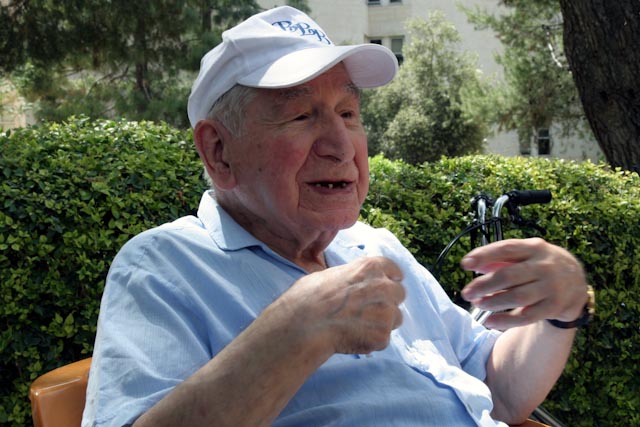
David Dimson - Elder of the Family dies aged 99 - 3rd Feruary 2010

This is the obituary written by his daughter Shalva, and printed in the Jerusalem Post.
David Eleazer Dimson was born in the Frumkin wine shop at 162 Commercial Road in London’s East End in 1910. He was the son of Zechariah Dimson, the rabbi of Stroud, Cheltenham and Gloucester, who received his smicha (rabbinical degree) at Mir Yeshiva and died of typhoid in Shaare Zedek Hospital in 1924. (Rabbi Abraham Isaac Kook delivered the euology). David's mother was Rachel Frumkin, born in Lithuania but brought as a baby by her father Rabbi Aryeh Leib Frumkin, author of Toldot Hochmei Yerushalayim, to Petah Tikva in 1884. The Frumkin family had been living on and off in Jerusalem since 1858, when Aryeh Leib's father Rabbi Shmuel Kelmer had gone to live in Eretz Yisrael in keeping with the ideology of the pupils of the Vilna Gaon.
David vividly recalled World War I, when he and his older brother Sam, who later became a renowned pediatrician and tropical disease specialist, used to travel round the Circle Round of the Underground until the "all clear" was sounded after the German Zeppelins were bombarding London. In 1917, the extended family decided to move out of London and purchased a house in Twyford. All the Frumkins, including Chief Rabbi Jonathan Sacks's maternal family, lived out the war years there, and the house (reputed to have a resident ghost!) became the venue for a local minyan.
In September 1919 the Dimson family moved to a large house in Clapton, London. The largest room was used as a synagogue, and during the High Holy Days up to 200 people were accommodated, sometimes spilling out onto the garden. In the same year, when David was nine, his paternal grandparents emigrated to Palestine. He recalled how Victoria Station resounded to the sounds of "Hatikva" as every member of the family bade them farewell.
IN 1919, David's mother decided to return to Palestine for a few months to retrieve the books of her father, who had died in 1917 and whose possessions had been seized by bailiffs in order to pay his debts. As the adventurous Rachel Dimson undertook the arduous sea journey, leaving her husband to look after the business, David was sent from one boarding school to another. He never seemed to stick at any of them, and often said that the worst was the Antwerp Tachkemoni school, where he was expected to translate a page of Gemara from Aramaic, which he didn't know, to Flemish, which he knew even less.
He finally acquired a matriculation certificate much later in life when he went on aliya in 1932. There he worked picking oranges, but later was employed by the British Military Missions in Palestine as an English teacher for the Polish and Greek armies. He took the matriculation examination with his pupils, his heart pounding for fear that he, the teacher, would fail.
In 1929, Rachel Dimson, who was by then a widow, had opened a new kosher wine shop in Cricklewood Broadway, and David served as sales assistant and delivery boy. In late 1944, after the wine shop was bombed during the Blitz and David's mother was ill, he decided to return to London. He negotiated a seat on a RAF seaplane during the closing stages of WWII.
The next year he met Phyllis Heilpern, who later became headmistress of the Hasmonean Grammar School for Girls, and they married in 1946.
David warned his new wife that their sojourn in London was temporary. Both children - Elroy, a professor of finance at the London Business School, and Shalva, an anthropologist at the Hebrew University of Jerusalem - were given Hebrew names. Despite the fact that David spent many hours tending the garden, he never planted any trees since they would take several years to grow and they were thinking of making aliya.
The wine shop catered to the declining Jewish population, and then to the growing migrant community of West Indians and Irish. David himself was something of a connoisseur, not only distinguishing Beaujolais from Burgundy, but skillfully identifying the year of manufacture. In 1973, David retired from the wine shop. The family moved from Cricklewood to Henly's Corner to Woodside Park.
David was the ultimate autodidact. He knew eight languages. He was an intellectual in the true sense of the word, discussing current events with the same enthusiasm that he recited a Wordsworth sonnet. He was also a talmid hacham, regularly studying the Talmud. He was a staunchly observant Jew, who shut the wine shop on the Sabbath in an era in which the majority of Anglo-Jewry kept their businesses open and would ride to synagogue. David rarely missed a Shabbat service, even if he had to walk half an hour in the rain or snow to Walm Lane shul in Cricklewood, where he was a regular member. Just a month ago, David insisted in walking to shul in Woodside Park and refused a wheelchair on Shabbat. At the age of 99, David led the Seder, and up to a month ago recited all the prayers by heart.
David's real passion was his own family history, intertwined with his love
of Zion. Years before it was fashionable to study Jewish genealogy, he was busy
researching the Frumkin and Dimson families, reading and rereading letters written
in a wide variety of languages, including correspondence in Yiddish, French,
English and Hebrew with Chief Rabbi Adler, Chief Rabbi Dreyfus of Paris, Rabbi
Kook and others, and letters from his parents and grandparents describing life
in the early days of settlement in Eretz Yisrael. It was a natural request for
David to be buried in Jerusalem. He is survived by his wife Phyllis, son, Elroy,
daughter Shalva, eight grandchildren and nine great-grandchildren.